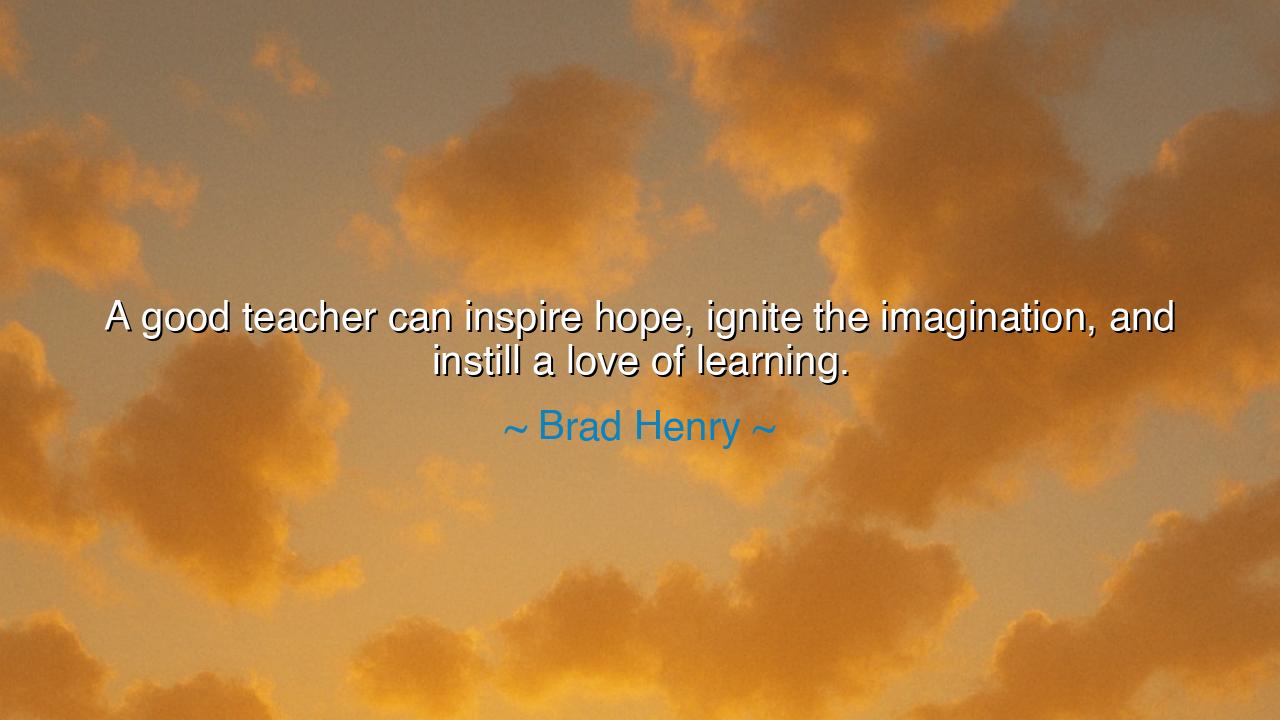
A good teacher can inspire hope, ignite the imagination, and
A good teacher can inspire hope, ignite the imagination, and instill a love of learning.






“A good teacher can inspire hope, ignite the imagination, and instill a love of learning.” Thus spoke Brad Henry, an American leader who, in these few words, captured the eternal essence of the teacher’s calling — a role as sacred as the philosopher, as noble as the poet, and as enduring as the flame of civilization itself. His statement is not a simple tribute to educators; it is a recognition of the divine power they wield — the power to awaken souls, to turn despair into possibility, and to plant in the mind the seeds of wisdom that outlive their mortal voices. For every age has been shaped not by kings or conquerors, but by teachers, who quietly forge the hearts of those who will shape the world to come.
In ancient times, the teacher was not merely a bearer of knowledge, but a midwife of the mind, guiding the birth of understanding in another. Socrates, walking the streets of Athens, taught not through authority but through dialogue. He did not impose truth; he coaxed it from within, proving that the role of the teacher is not to fill the student with facts but to ignite the imagination — to set fire to the inner spark of curiosity that makes learning a lifelong pursuit. When Brad Henry speaks of “inspiring hope,” he echoes this ancient ideal. The teacher must remind the student that learning is not a burden, but a liberation — that through knowledge, even the smallest person may transcend their circumstance and touch greatness.
The origin of the quote reflects Henry’s belief in education as the foundation of a just and thriving society. During his time as governor of Oklahoma, he often spoke of the transformative power of education — not as a system, but as a human encounter between the inspired and the willing. He understood that schools may crumble, policies may change, but the light of a good teacher endures. To “inspire hope” is to reach into the dark places of uncertainty within a child and whisper: you can. To “ignite the imagination” is to remind them that the world is not fixed, but waiting to be remade by their hands. And to “instill a love of learning” is to grant them a treasure that no failure, no poverty, no sorrow can take away.
History gives us many such teachers — souls whose influence rippled far beyond their time. Consider Anne Sullivan, the teacher of Helen Keller, who faced the impossible task of bringing language to a girl locked in silence and darkness. Through patience and faith, she reached her, not through harsh command but through hope. When Helen first understood that the signs traced upon her hand meant “water,” her mind and soul were awakened to a new universe. That moment — one teacher, one student, one act of faith — changed not only a life, but the world’s understanding of the human spirit. In Sullivan’s example we see the living embodiment of Henry’s words: a teacher igniting imagination, instilling love, and awakening the dormant flame of possibility.
There is also the story of Aristotle and his pupil Alexander the Great. The philosopher taught not for conquest, but for wisdom, instructing the young prince that the greatest empire was not of land, but of the mind. Though Alexander would go on to build an empire of stone and blood, it was the lessons of his teacher that lingered — the belief in order, inquiry, and meaning. From this union of thought and action came both the glory and the tragedy of the Hellenistic world. Thus we see how teaching, when done with passion, shapes not only individuals but civilizations. For in every great leader there stands, unseen behind him, a teacher whose words first opened his eyes.
To be a teacher, then, is to walk a path of both humility and divinity. You shape others not by command, but by presence — not through power, but through example. The good teacher does not say, “Be like me,” but rather, “Find the best of yourself.” They do not merely impart answers, but awaken wonder — that holy unrest that drives the human mind to explore, question, and dream. The teacher’s reward is not fame or wealth, but the quiet knowing that their labor continues through generations — in the kindness of the doctor they once taught, in the courage of the builder they once encouraged, in the brilliance of the poet whose imagination they once dared to ignite.
So, my child, heed this truth: seek the teachers who kindle your fire, and when the time comes, become one yourself. If you lead, lead as a teacher does — with patience and faith in those who follow. If you create, do so with the humility to learn anew. And if you ever despair of the world’s darkness, remember this: one good teacher can rekindle the light of a thousand souls. Hope, imagination, and love of learning — these are not mere gifts; they are legacies. And those who pass them on become immortal, for their influence does not die, but endures in every mind they have awakened.
For as Brad Henry reminds us, a good teacher does not merely instruct — they inspire. They do not build walls of knowledge, but open gates to infinity. They remind humanity that in every heart lies a student, and in every student, the potential to change the world. Such is the sacred fire of teaching — a flame passed from generation to generation, a torch that lights the way from ignorance to enlightenment, from despair to hope, and from darkness to everlasting light.






AAdministratorAdministrator
Welcome, honored guests. Please leave a comment, we will respond soon